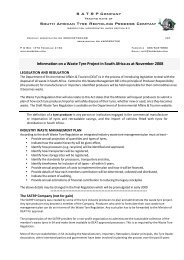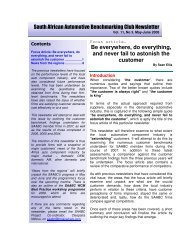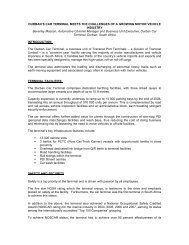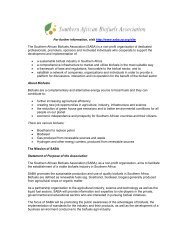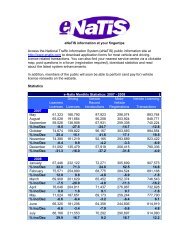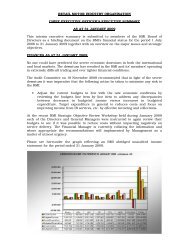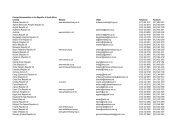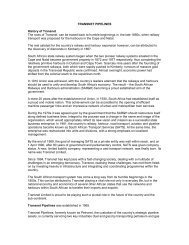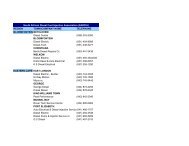Toyota South Africa Sustainability Report 2008 - Automotiveonline ...
Toyota South Africa Sustainability Report 2008 - Automotiveonline ...
Toyota South Africa Sustainability Report 2008 - Automotiveonline ...
Create successful ePaper yourself
Turn your PDF publications into a flip-book with our unique Google optimized e-Paper software.
<strong>Sustainability</strong> <strong>Report</strong>_14-10-<strong>2008</strong>:Layout 1 10/14/08 2:45 PM Page 33<br />
Employment Equity<br />
Fairness and equal opportunities<br />
underpin <strong>Toyota</strong> <strong>South</strong> <strong>Africa</strong>’s<br />
implementation of respect for<br />
employees. Employment equity<br />
is a business strategy that strives<br />
to ensure that everyone involved<br />
is able to both participate in, and<br />
benefit from, the activities of the<br />
business in a fair manner.<br />
<strong>Toyota</strong> aims to be an effective socially aligned institution in <strong>South</strong> <strong>Africa</strong>.We will know<br />
this vision has been attained when:<br />
• Each initiative provides a return on each Rand spent;<br />
• All clients acknowledge that we add value to their lives;<br />
• We deliver consistent value through our processes;<br />
• Our services are delivered by competent employees; and<br />
• We achieve the desired social impact results.<br />
We are facing significant challenges in meeting the demands of quality and efficiency<br />
as required by <strong>Toyota</strong> Motor Corporation, and simultaneously addressing the local<br />
challenges of job creation and contributing to a thriving economy. In the entire <strong>Toyota</strong><br />
Motor Corporation family of affiliates, <strong>Toyota</strong> <strong>South</strong> <strong>Africa</strong> has the highest headcount<br />
for the volume of vehicles produced; a situation that is out of sync with <strong>Toyota</strong>’s global<br />
affiliates.We are therefore focusing on improving efficiencies especially in the services<br />
and manufacturing areas.<br />
Our employment equity (EE) plan was first mooted in 1998. Since then, we have<br />
focussed our efforts on getting full representivity, and monitoring the<br />
implementation of the plan. Our intention is to fulfill our employment equity<br />
obligations by 2011. We hope by then to have embedded employment equity into the<br />
fabric of our company. En route, we are in the process of revising the EE Strategy,<br />
which is to be ratified later in <strong>2008</strong>. <strong>Toyota</strong> faces the same challenges as other heavy<br />
industry in attracting a high percentage of female staff. Attracting and retaining<br />
young <strong>Africa</strong>n staff remains a challenge. Of total staff, the Executive comprise 1%,<br />
salaried staff 26% and hourly staff 73%.<br />
The representation of female staff at senior management level and above consequently<br />
remains low (see graph below). There has however been a 7% increase in female<br />
General Managers in the past 2 years (see graph on page 34).<br />
GENDER AND SKILLS LEVELS FY’07<br />
100%<br />
90%<br />
80%<br />
70%<br />
60%<br />
50%<br />
40%<br />
30%<br />
Our employment equity strategy aims to create a fair and equal opportunity culture,<br />
while facilitating social and business development that promotes the company<br />
through interaction with the communities we serve. We strive to procure from small,<br />
medium and micro enterprises (SMMEs) and provide relevant information to<br />
Government.<br />
20%<br />
10%<br />
0%<br />
Team Team Leaders Admin & Asst Managers Managers Senior General Vice<br />
Members & Tech Clerical & GL’s Managers Managers Presidents<br />
Female<br />
Male<br />
<strong>Sustainability</strong> <strong>Report</strong> <strong>2008</strong> 33



